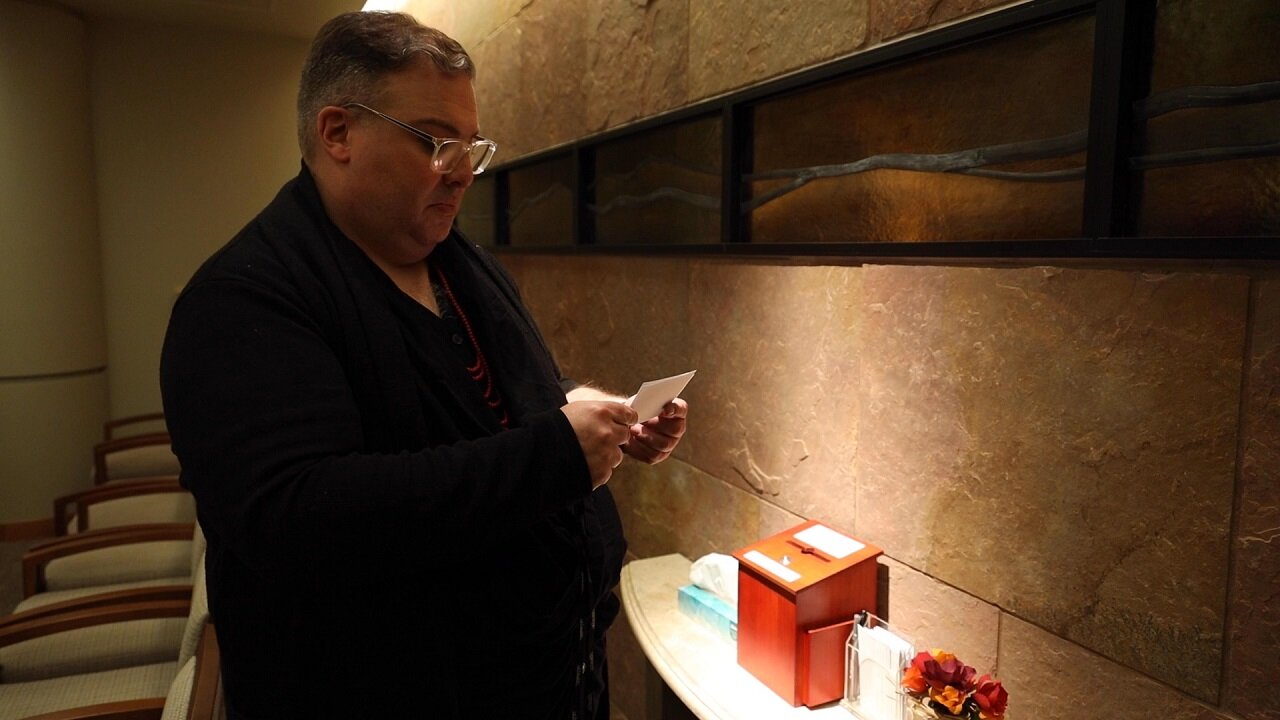A non-binary pastor and hospital chaplain hopes to make religion more accepting

AURORA, Colo. — Ben Mann doesn’t fit the typical mold of a Protestant pastor.
Mann, who is non-binary ad uses they/them pronouns, wears high-heeled shoes and makeup. Their altar sits beneath a transgender Pride flag and they’re surrounded by rainbows.
For many, being both non-binary and a pastor could conflict. But for Mann, the two identities complete each other.
“As queer people, I think we have a unique view of the world and the ability to question and wonder and hold strength within ourselves when we offer that power to one another,” Mann said. “I think that makes us an interesting element to society.”
Mann is the associate pastor at Mayflower Congregational Church in Englewood and a chaplain at UCHealth on the University of Colorado Anschutz Medical Campus. Their role at the church is typical for a pastor — deliver sermons from the Bible with context for modern life. At the hospital, Mann works with patients of various faiths to bring comfort to them during what are often traumatic circumstances.
“People come to the hospital and are instantly vulnerable,” Mann said. “We strip them down, we tell them where to lay and what to do. We instantly start poking and prodding them and that can be a really inhumane experience.”
“I find, as a chaplain, I get to inject a lot of humanity into a person and a family’s experience,” Mann added.
Mann grew up in a conservative, religious household in Oklahoma. Though they often struggled to see their place as a queer person in the Christian church, Mann never lost their faith. Lessons from Jesus Christ’s teachings are still a core part of their belief system, but Mann no longer identifies with the word “Christian,” as they do not like the rise of alt-right Christianity in recent years and the way the religion has been weaponized.
“I find the term ‘Christian,’ to be highly problematic, only because of the brand in my country that it’s taken on,” Mann explained. “I think it’s almost an understatement to say that we see the repercussions of an Evangelical Christianity that are so pervasive, and I think that speaks to the underlying tensions where we see Christianity being used as a weapon to hurt people.”
[Related: A divide between the pulpit and the pew is roiling the evangelical church]

In its purest form, Mann believes Christianity can serve the most marginalized people and bring communities together, but the faith has lost sight of its roots, they said.
“The loudest voices get to claim what they believe that term to mean,” Mann said of the word ‘Christian.’ “I think there’s a correction of the narrative. Being smart and savvy with our narrative, breaking out of traditions that no longer serve people.”
Little data exists on how many LGBTQ+ community members are represented in the clergy, but a Pew Research Center study from 2014 found more churches are accepting LGBTQ+ people and moving away from teachings about homosexuality being a sin that were once a staple of many Christian sects.
As progressive churches continue to put themselves on the map, Mann hopes LGBTQ+ people who were once harmed by Christianity can find a place for the good parts of religion in their hearts.
“There’s a deep hunger in our culture to understand spirit and to understand self,” Mann said. “There are answers, there are opportunities to grow, and I hope the trauma from their past won’t prevent them from growing.”
Mann also believes LGBTQ+ people have a unique outlook of the world due to the difficulties they often face.
“I think queer people have a wonderful opportunity to be leaders in so many different facets of culture, including inside and outside of faith communities and other places,” Mann said. “I think we have a unique view of the world and the ability to question and wonder and hold strength within ourselves when we offer that power to one another."
Alison Berg is a multimedia journalist at Rocky Mountain PBS. She can be reached at alisonberg@rmpbs.org
Jeremy Moore is the senior multimedia journalist at Rocky Mountain PBS. You can email him at jeremymoore@rmpbs.org.
Kate Johnson is a video editor with Rocky Mountain PBS. You can reach her at katejohnson@rmpbs.org.